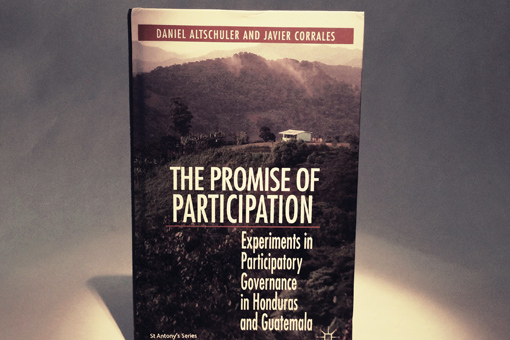Can democracy be built from the bottom up? Does community participation in small-scale initiatives increase civic and political engagement in the democratic process overall? In The Promise of Participation: Experiments in Participatory Governance in Honduras and Guatemala, Daniel Altschuler and Javier Corrales argue that efforts to engage local communities through community-managed schools (CMS) can increase civic participation more broadly, but require strong state support over time—support made difficult by prevailing legacies of authoritarianism and social exclusion.
Their book is a welcome contribution to the long-standing discussion on whether and how civic participation bolsters civil society and, in turn, strengthens democracy.
Facing weak civil society left behind by authoritarian regimes, Guatemala and Honduras decided in the 1990s to try a new strategy to promote civic engagement and improve education in disconnected rural communities. Decision-making authority over public schools was transferred from the government to the communities. Parents and community members in poor, rural areas took on responsibilities from managing school budgets to hiring and firing teachers.
Corrales, a political science professor at Amherst College, and Altschuler, a community organizer and political scientist, explore the impact of those programs in detail. Why schools? Especially in rural communities, they provide a natural platform for parents and community members to participate in decision making that directly affects their lives. International donors like the World Bank have recognized this and provided funding to the programs in Guatemala, Honduras and other countries.
The authors also point out that CMS programs have benefited from support across the political spectrum. As they note, “Participatory initiatives appealed to the ideological left (though not teachers unions) because of their ability to enhance participatory democracy, serve as a check on state power and improve social service provision.” At the same time, they “appealed to the ideological right because of their support for circumscribing the role of the central government.”
The book draws on an impressive amount of survey data the authors collected in more than 400 communities, and offers well-thought-out analysis. The quantitative information is complemented by case studies in some of the same communities.
The authors are candid about the limitations they faced. For example, the lack of a baseline for levels of community participation forced them to measure changes in members’ participation on the basis of their recollections. As they acknowledge, this is not the type of counterfactual analysis social scientists are increasingly using these days. Nevertheless, the level of care the authors took in their statistical analyses and the use of qualitative analysis ends up making a compelling case overall.
Altschuler and Corrales are refreshingly clear and meticulous in defining the questions they address, spelling out the logic of their arguments in an accessible way. They transparently explain how they went about measuring abstract concepts that are central to their argument. We know that “political learning among the poor” was measured by how those interviewed assessed their deliberative skills and their motivation and confidence in participating in decision-making bodies. Or that “reshaping of political networks” was measured by the increase in number of civil society organizations and the involvement of excluded groups in those organizations.
Altschuler and Corrales conclude that CMS did increase communities’ capacity for civic participation. For example, 77 percent of Guatemalan respondents and 53 percent of Honduran respondents reported learning at least one skill by participating in managing their local school, and 34 percent and 26 percent, respectively, reported applying those skills to other organizations. But they also found that, overall, those higher capacities did not result in deeper transformations in the way civil society engages with governments to influence decisions and demand accountability.
The case studies found that while there was a thickening of civil society (that is, more organizations with more membership), there was not an improved ability to advocate for the community or engage with the state.
The authors also found a wide divergence in the benefits of CMS. Those with higher socioeconomic status and a higher level of personal involvement in the school councils acquired more skills. Those communities receiving greater levels of state support for training also developed more skills. And women did not learn as many skills as men.
“Being female had a negative impact on the likelihood of subsequent leadership, reinforcing the hypothesis that traditional/conservative gender norms towards women impacted spillover outcomes,” they said.
The most interesting parts of the book examine how national political dynamics effectively limited the impact of CMS. In Honduras, patronage was a major factor, and the program was transformed from one to empower parents to run schools into a tool for partisan political advantage.
“Contrary to the program’s design, parents did not hire teachers in many [project community] schools. Instead, promotores [program employees appointed by the government] hired teachers with political recommendations.” This, paradoxically, ends up protecting the program and sustaining it over time.
For Altschuler and Corrales, the central question is whether small-scale participatory initiatives such as CMS can contribute to broader participatory governance. Their answer is finely balanced and sensible—ostensibly yes, but partisan interests and prevailing traditions of social exclusion seriously hampered the program’s potential.
This book should motivate supporters of local participatory initiatives to go back to the drawing board to see how it could be done better. Others, however, may find in it a confirmation that small-scale experiments in participatory governance are an insufficient counterweight to entrenched, non-democratic, political legacies. Regardless of which side of the debate the reader is on, The Promise of Participation provides a refreshing and enlightened perspective on a question that is fundamental to all countries in Latin America.





